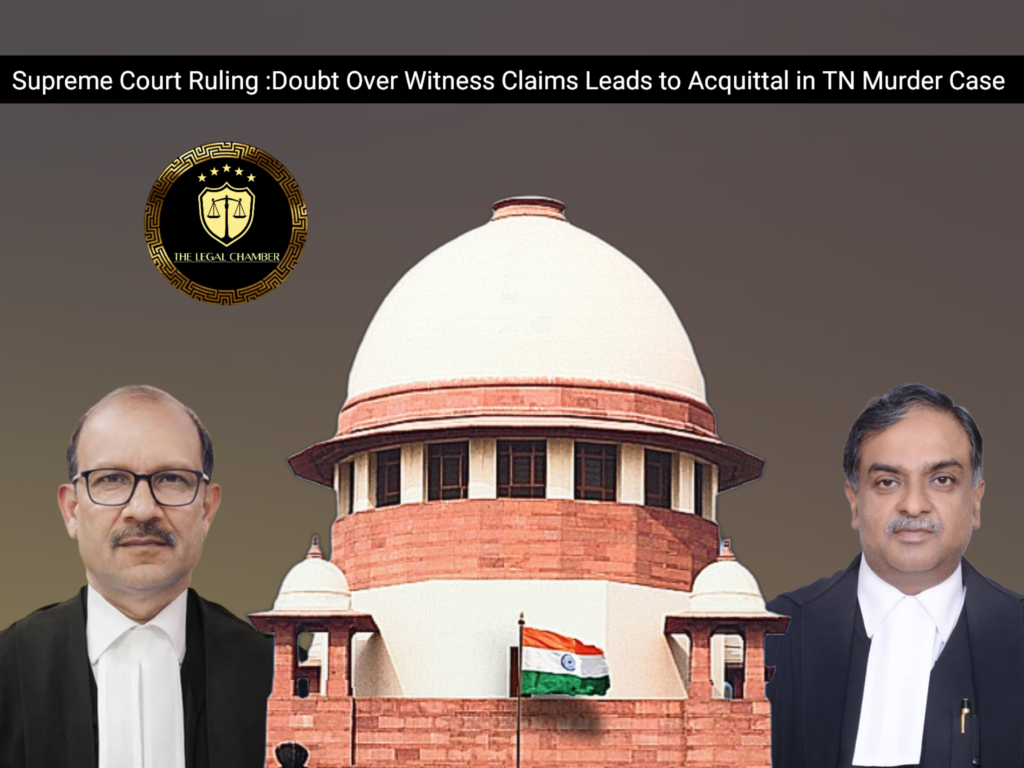
The Supreme Court acquitted the appellants, overturning their conviction under Sections 302 and 34 IPC, due to unreliable eyewitness testimonies. The Court emphasized the need for cautious scrutiny of related witnesses (PW-1 and PW-2) and highlighted improbabilities in their accounts, including the unrealistic timeline of events. The prosecution failed to prove guilt beyond reasonable doubt, rendering the conviction unsustainable. The judgments of the Trial Court and High Court were set aside, underscoring the principle that doubts in prosecution cases must benefit the accused.
Facts Of The Case:
The case involves the murder of Edison Suvisedha Muthu, a habitual drunkard with a criminal record, including detention under the Tamil Nadu Goondas Act. The prosecution alleged that on 14.04.2013, Accused No. 2 (Esakkimuthu) lured the deceased to a liquor shop on a motorcycle, while Accused No. 1 (Pitchu Mani) attacked him with a weapon in retaliation for a prior feud. The deceased’s son (PW-1) and wife (PW-2) claimed to have witnessed the crime after allegedly cycling 16 km in 30 minutes to reach the shop. The Trial Court and Madras High Court convicted the appellants based on their testimonies, despite other eyewitnesses turning hostile. The Supreme Court, however, found the prosecution’s case improbable, noting inconsistencies in the witnesses’ accounts, including the unrealistic timeline of covering 16 km by bicycle in half an hour and their failure to report the crime immediately despite passing a police station. The Court also observed that the multiple injuries on the deceased suggested involvement of more assailants, casting doubt on the appellants’ exclusive guilt. Due to these discrepancies and lack of corroborative evidence, the Supreme Court acquitted the appellants, setting aside the lower courts’ judgments.
Procedural History:
The case originated with the conviction of the appellants, Pitchu Mani and Esakkimuthu, by the Trial Court under Sections 302 (murder) and 34 (common intention) of the IPC, based on eyewitness testimonies of the deceased’s son (PW-1) and wife (PW-2). The appellants were sentenced to life imprisonment. They appealed to the Madras High Court, which upheld the Trial Court’s judgment, dismissing their challenge. Dissatisfied, the appellants filed Special Leave Petitions (SLPs) before the Supreme Court, which granted leave and heard the appeals. The Supreme Court critically examined the prosecution’s case, particularly the reliability of the eyewitness accounts and the improbability of their claims, including the unrealistic timeline of events. Ultimately, the Court found the prosecution’s evidence insufficient to prove guilt beyond reasonable doubt and acquitted the appellants, setting aside the judgments of both the Trial Court and the High Court. The decision underscored the necessity of scrutinizing related witnesses with caution and ensuring no reasonable doubt remains in criminal convictions.
READ ALSO:Supreme Court Uses Special Powers to Protect Student’s Hard-Earned Postgraduate Degree
Court Observation:
The Supreme Court made several critical observations while overturning the convictions. It emphasized that the testimonies of PW-1 and PW-2, being closely related to the deceased, required rigorous scrutiny due to their inherent interest in the case. The Court found their claim of covering 16 km by bicycle in 30 minutes to be physically implausible, creating reasonable doubt about their presence at the crime scene. It noted the unnatural conduct of these witnesses in failing to intervene during the attack or promptly report the incident despite passing a police station. The Court also highlighted contradictions in the prosecution’s case, including hostile independent witnesses and medical evidence suggesting multiple assailants, which contradicted the theory of sole culpability. Importantly, the judgment reiterated that mere suspicion or probability cannot substitute proof beyond reasonable doubt in criminal cases. The Court concluded that the prosecution failed to establish a coherent chain of circumstances, and the benefit of doubt must invariably favor the accused. These observations underscored the judiciary’s role in ensuring that convictions rest on unimpeachable evidence rather than conjectures.
Final Decision & Judgement:
The Supreme Court allowed the appeals and acquitted the appellants, Pitchu Mani and Esakkimuthu, of all charges under Sections 302 and 34 of the IPC. The Court held that the prosecution failed to prove their guilt beyond reasonable doubt, primarily due to the unreliable nature of the eyewitness testimonies provided by the deceased’s son (PW-1) and wife (PW-2). The judgments of the Trial Court and the Madras High Court, which had convicted and upheld the sentences, were set aside. The Court emphasized that the improbabilities in the prosecution’s case, including the unrealistic timeline and the witnesses’ unnatural conduct, created sufficient doubt warranting acquittal. The appellants were ordered to be released immediately unless detained in connection with any other case. The judgment reinforced the fundamental principle of criminal jurisprudence that when the prosecution’s case contains material contradictions and lacks credibility, the benefit of doubt must invariably be granted to the accused.
Case Details:
Case Title:Esakkimuthu & Anr. vs. State Represented by The Inspector of Police Citation: 2025 INSC 880 Criminal Appeal No.:(Arising out of SLP (Crl.) No. 1693 of 2025 Date of Judgment:22nd July 2025 Judges/Justice Name: Justice Vikram Nath & Justice Sandeep Mehta
Download The Judgement Here